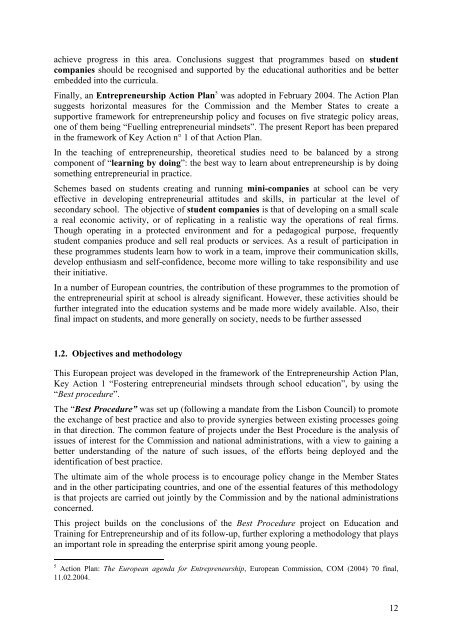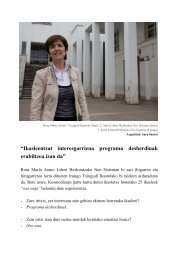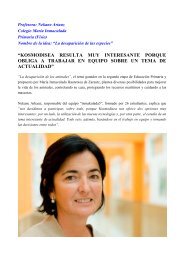Final Report of the Expert Group - European Commission - Europa
Final Report of the Expert Group - European Commission - Europa
Final Report of the Expert Group - European Commission - Europa
You also want an ePaper? Increase the reach of your titles
YUMPU automatically turns print PDFs into web optimized ePapers that Google loves.
achieve progress in this area. Conclusions suggest that programmes based on studentcompanies should be recognised and supported by <strong>the</strong> educational authorities and be betterembedded into <strong>the</strong> curricula.<strong>Final</strong>ly, an Entrepreneurship Action Plan 5 was adopted in February 2004. The Action Plansuggests horizontal measures for <strong>the</strong> <strong>Commission</strong> and <strong>the</strong> Member States to create asupportive framework for entrepreneurship policy and focuses on five strategic policy areas,one <strong>of</strong> <strong>the</strong>m being “Fuelling entrepreneurial mindsets”. The present <strong>Report</strong> has been preparedin <strong>the</strong> framework <strong>of</strong> Key Action n° 1 <strong>of</strong> that Action Plan.In <strong>the</strong> teaching <strong>of</strong> entrepreneurship, <strong>the</strong>oretical studies need to be balanced by a strongcomponent <strong>of</strong> “learning by doing”: <strong>the</strong> best way to learn about entrepreneurship is by doingsomething entrepreneurial in practice.Schemes based on students creating and running mini-companies at school can be veryeffective in developing entrepreneurial attitudes and skills, in particular at <strong>the</strong> level <strong>of</strong>secondary school. The objective <strong>of</strong> student companies is that <strong>of</strong> developing on a small scalea real economic activity, or <strong>of</strong> replicating in a realistic way <strong>the</strong> operations <strong>of</strong> real firms.Though operating in a protected environment and for a pedagogical purpose, frequentlystudent companies produce and sell real products or services. As a result <strong>of</strong> participation in<strong>the</strong>se programmes students learn how to work in a team, improve <strong>the</strong>ir communication skills,develop enthusiasm and self-confidence, become more willing to take responsibility and use<strong>the</strong>ir initiative.In a number <strong>of</strong> <strong>European</strong> countries, <strong>the</strong> contribution <strong>of</strong> <strong>the</strong>se programmes to <strong>the</strong> promotion <strong>of</strong><strong>the</strong> entrepreneurial spirit at school is already significant. However, <strong>the</strong>se activities should befur<strong>the</strong>r integrated into <strong>the</strong> education systems and be made more widely available. Also, <strong>the</strong>irfinal impact on students, and more generally on society, needs to be fur<strong>the</strong>r assessed1.2. Objectives and methodologyThis <strong>European</strong> project was developed in <strong>the</strong> framework <strong>of</strong> <strong>the</strong> Entrepreneurship Action Plan,Key Action 1 “Fostering entrepreneurial mindsets through school education”, by using <strong>the</strong>“Best procedure”.The “Best Procedure” was set up (following a mandate from <strong>the</strong> Lisbon Council) to promote<strong>the</strong> exchange <strong>of</strong> best practice and also to provide synergies between existing processes goingin that direction. The common feature <strong>of</strong> projects under <strong>the</strong> Best Procedure is <strong>the</strong> analysis <strong>of</strong>issues <strong>of</strong> interest for <strong>the</strong> <strong>Commission</strong> and national administrations, with a view to gaining abetter understanding <strong>of</strong> <strong>the</strong> nature <strong>of</strong> such issues, <strong>of</strong> <strong>the</strong> efforts being deployed and <strong>the</strong>identification <strong>of</strong> best practice.The ultimate aim <strong>of</strong> <strong>the</strong> whole process is to encourage policy change in <strong>the</strong> Member Statesand in <strong>the</strong> o<strong>the</strong>r participating countries, and one <strong>of</strong> <strong>the</strong> essential features <strong>of</strong> this methodologyis that projects are carried out jointly by <strong>the</strong> <strong>Commission</strong> and by <strong>the</strong> national administrationsconcerned.This project builds on <strong>the</strong> conclusions <strong>of</strong> <strong>the</strong> Best Procedure project on Education andTraining for Entrepreneurship and <strong>of</strong> its follow-up, fur<strong>the</strong>r exploring a methodology that playsan important role in spreading <strong>the</strong> enterprise spirit among young people.5 Action Plan: The <strong>European</strong> agenda for Entrepreneurship, <strong>European</strong> <strong>Commission</strong>, COM (2004) 70 final,11.02.2004.12




